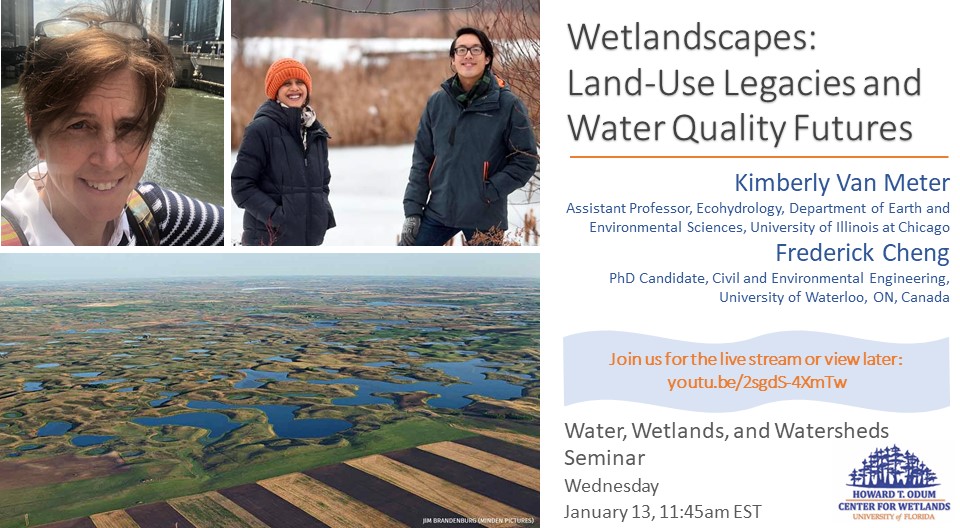January 13, 2021
Wetlandscapes: Land-Use legacies and water quality futures
Kimberly Van Meter, Assistant Professor, Ecohydrology, Department of Earth and Environmental Sciences, University of Illinois at Chicago
&
Frederick Cheng, PhD Candidate, Civil and Environmental Engineering, University of Waterloo, ON, Canada
Join us for the live stream Jan 13, 11:45am EST, or view later: https://youtu.be/2sgdS-4XmTw
Abstract
More than 50% of global wetland area has been lost over the last 200 years, resulting in losses of habitat and species diversity as well as decreased hydrologic and biogeochemical functionality. Recognition of the magnitude of wetland loss as well as the wide variety of ecosystem services provided by wetlands has in recent decades led to an increased focus on wetland restoration. Restoration activities, however, often proceed in an ad hoc manner, with a focus on maximizing the total restored area rather than on other spatial attributes of the wetland network. In this seminar, we will discuss the importance of a landscape-scale approach to wetland restoration and protection, and will provide a broad context for thinking about the effects of wetlands on water quality. We will first discuss spatial patterns of wetland loss and the potential implications of these losses on ecosystem functionality. Here, we will specifically focus on the disproportionate loss of smaller wetlands found in the North American Prairie Pothole region. Next, we will discuss in more detail the role of wetland size in driving biogeochemical behavior. In particular, we will discuss differences in nitrogen (N) and phosphorus (P) removal rates across a continuum of wetland size. Finally, we will discuss our most recent work, in which we have used National Wetland Inventory data and 5-km grid-scale estimates of N inputs and outputs to estimate current wetland N removal by U.S. wetlands. We will show results suggesting a clear, spatial disconnect between high-density wetland areas and N hotspots, and we will discuss future U.S.-scale scenarios for wetland restoration, which focus on maximizing N removal and thus providing powerful water quality benefits.
Bio
Kimberly Van Meter is an assistant professor working in the Department of Earth and Environmental Sciences at the University of Illinois at Chicago. In her work, she explores the ways in which climate, land use, and management practices impact surface water and groundwater quality in anthropogenic landscapes. She is particularly interested in interactions and feedbacks between human and natural systems. In recent work, she has focused on the long-term impacts of intensive agricultural practices and on water quality and has developed the ELEMeNT model, a parsimonious modeling framework for exploring long-term trajectories in nutrient dynamics.
Fred Cheng is a PhD candidate in civil and environmental engineering at the University of Waterloo. His research focuses on quantifying the role of reactive interfaces in local and regional biogeochemical cycles. In particular, he is interested in how the management of reactive interfaces such as wetlands, hyporheic zones, and the vadose zone can mitigate the impacts of agricultural pollutants on downstream water systems.
Seminar postcard

